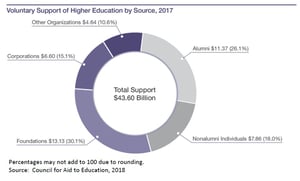Billion dollar donations continue to go to top-tier institutions (which already see the largest university endowments), while everyone else continues to grind for a little bit here or there.

Sound familiar?
Giving, in and of itself, has not really changed that much in terms of population percentages. However, the tremendous diversity of places a person might donate has fundamentally shifted who gets those hard earned dollars. What used to be earmarked as donations for alumni organizations or churches (the two largest areas for philanthropy over the past Century) now see competitors in everything from staggering storm relief to social justice organizations to personal GoFundMe campaigns.
Sometimes just as hard, is finding a satisfactory fundraising solution for a specific donor who wants to tie a cause or theme to the donation. What does a school do when a donor asks to donate for medical research to a school with no medical school?
So, Advancement leaders often develop a "whatever-it-takes" strategy, trying to find any meaningful connection to potential donors. And just who are those donors?
For most institutions, the heavy reliance is on alumni. Students who are benefiting from the degree they received might want to "pay it forward" in some financial way. And so, quite pragmatically, the plight of the Advancement office and officer is really one of connecting. How do you connect with graduates of the institution in a way that is genuine, but also offers up authentic opportunities for financial conversations?
A More Connected Way
Campus was originally built for the current student experience, but quickly found footing on the pre-student as well as post-student parts of the life-cycle. Why? Because savvy enrollment and alumni officers soon saw the power of connection that would help retain students as a way to connect everyone else too.
The underpinnings of connectedness have been there for a few years with Advancement offices. Everyone tries to use Facebook or LinkedIn groups / sites to help promote, connect, and ultimately to request aid. The idea is to leverage the power of socialness in conjunction with the need for donations. Connection is everything.
But as most Advancement offices soon found out, those channels can be problematic. We have talked with Advancement officers who had security breaches with those public sites, no ability to control messaging, desirable but unavailable data, and even public relations issues, as the school's groups were somehow connected to bad actors.
So, unlike public social media sites, Campus is a walled-garden. It's a place to control the message, see the usage statistics, and promote far more meaningful connections. No, it does not replace some tools that are good for job searches, etc. Instead, it leverages the power of the connections made during the collegiate experience, and promotes that as alumni.
Imagine far more powerful, meaningful groupings of alumni with availability to talk, help, support, and promote. Yes, most schools use an "All Alumni" channel, welcoming each new graduating class to the mix. But in addition to that, your institution can put nurses in a healthcare alumni group, your New York grads in a NYC group, and hiring managers in a group of their own.

Additionally, you can add tools, resources, and content pages, specific to the alumni's job sector, region, or simply desired area automatically. You can group students by the year they graduated just as easily as clustering by program or by undergraduate degree vs graduate degree.
The system can be used to cluster and promote any segment at all, from a Board of Trustees group to a Career Services team. And that power can translate across life-cycle areas too.
Imagine an "adopt a Freshman" campaign, whereby you connect an alumni with an 18 year old student. Powerful. Imagine a digital speaker series where an Engineer graduate talks with current Engineering students, etc. Imagine connecting your Alumni Ambassadors with prospects, showing them the true power of "what can happen" through someone who has done it.
And imagine how that connection can change an alumni's response to financial conversations. Not only are they more likely to see real or persistent needs, when the system helps them connect anyway, that connection drives value. It is not like receiving a gift request long after graduation only to think, "What you have done for me lately?" Instead, it is an on-going dialogue, peppered with support and collegiality, resulting in occasional conversations about money.
Campus is different than other platforms. A true, across the life-cycle system, it connects everyone and everything that are important at your institution. That includes your graduates as well as the alumni officers. We'll say it again: Connection Is Everything.
We hope you'll ask us more about how to better connect your alumni to the institution after they move out into the world.
The Campus Team


